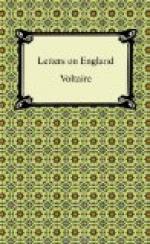The English read with the highest satisfaction, and translated into their tongue, the Elogium of Sir Isaac Newton, which M. de Fontenelle spoke in the Academy of Sciences. M. de Fontenelle presides as judge over philosophers; and the English expected his decision, as a solemn declaration of the superiority of the English philosophy over that of the French. But when it was found that this gentleman had compared Descartes to Sir Isaac, the whole Royal Society in London rose up in arms. So far from acquiescing with M. Fontenelle’s judgment, they criticised his discourse. And even several (who, however, were not the ablest philosophers in that body) were offended at the comparison; and for no other reason but because Descartes was a Frenchman.
It must be confessed that these two great men differed very much in conduct, in fortune, and in philosophy.
Nature had indulged Descartes with a shining and strong imagination, whence he became a very singular person both in private life and in his manner of reasoning. This imagination could not conceal itself even in his philosophical works, which are everywhere adorned with very shining, ingenious metaphors and figures. Nature had almost made him a poet; and indeed he wrote a piece of poetry for the entertainment of Christina, Queen of Sweden, which however was suppressed in honour to his memory.
He embraced a military life for some time, and afterwards becoming a complete philosopher, he did not think the passion of love derogatory to his character. He had by his mistress a daughter called Froncine, who died young, and was very much regretted by him. Thus he experienced every passion incident to mankind.
He was a long time of opinion that it would be necessary for him to fly from the society of his fellow creatures, and especially from his native country, in order to enjoy the happiness of cultivating his philosophical studies in full liberty.
Descartes was very right, for his contemporaries were not knowing enough to improve and enlighten his understanding, and were capable of little else than of giving him uneasiness.
He left France purely to go in search of truth, which was then persecuted by the wretched philosophy of the schools. However, he found that reason was as much disguised and depraved in the universities of Holland, into which he withdrew, as in his own country. For at the time that the French condemned the only propositions of his philosophy which were true, he was persecuted by the pretended philosophers of Holland, who understood him no better; and who, having a nearer view of his glory, hated his person the more, so that he was obliged to leave Utrecht. Descartes was injuriously accused of being an atheist, the last refuge of religious scandal: and he who had employed all the sagacity and penetration of his genius, in searching for new proofs of the existence of a God, was suspected to believe there was no such Being.




